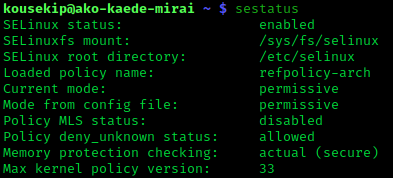|
SELinux
Security-Enhanced Linux (SELinux) is a Linux kernel security module that provides a mechanism for supporting access control security policies, including mandatory access controls (MAC). SELinux is a set of kernel modifications and user-space tools that have been added to various Linux distributions. Its architecture strives to separate enforcement of security decisions from the security policy, and streamlines the amount of software involved with security policy enforcement. The key concepts underlying SELinux can be traced to several earlier projects by the United States National Security Agency (NSA). Overview The NSA Security-enhanced Linux Team describes NSA SELinux as a set of patches to the Linux kernel and utilities to provide a strong, flexible, mandatory access control (MAC) architecture into the major subsystems of the kernel. It provides an enhanced mechanism to enforce the separation of information based on confidentiality and integrity requirements, which allows th ... [...More Info...] [...Related Items...] OR: [Wikipedia] [Google] [Baidu] |
Simple Desktop Display Manager
Simple Desktop Display Manager (SDDM) is a X display manager, display manager (a graphical login program) for the X11 and Wayland (display server protocol), Wayland windowing systems. SDDM was written from scratch in C++11 and supports theming via QML. SDDM is free and open-source software subject to the terms of the GNU General Public License version 2 or later. Adoption In 2013, Fedora (operating system), Fedora KDE members decided to default to SDDM in Fedora 21. KDE chose SDDM to be the successor of the KDE Display Manager for KDE Plasma 5. The LXQt developers recommend SDDM as a display manager. See also * LightDM, Light display manager, formerly written for Ubuntu (operating system), Ubuntu, now independent * GNOME Display Manager, GDM, the default graphical login program for GNOME References KDE Software Compilation Software that uses QML Software that uses Qt X display managers {{compu-graphics-stub ... [...More Info...] [...Related Items...] OR: [Wikipedia] [Google] [Baidu] |
Setuid
The Unix and Linux access rights flags setuid and setgid (short for ''set user identity'' and ''set group identity'') allow users to run an executable with the file system permissions of the executable's owner or group respectively and to change behaviour in directories. They are often used to allow users on a computer system to run programs with temporarily elevated privileges to perform a specific task. While the assumed user id or group id privileges provided are not always elevated, at a minimum they are specific. The flags setuid and setgid are needed for tasks that require different privileges than what the user is normally granted, such as the ability to alter system files or databases to change their login password. Some of the tasks that require additional privileges may not immediately be obvious, though, such as the ping command, which must send and listen for control packets on a network interface. File modes The setuid and setgid bits are normally represented a ... [...More Info...] [...Related Items...] OR: [Wikipedia] [Google] [Baidu] |
FreeBSD
FreeBSD is a free-software Unix-like operating system descended from the Berkeley Software Distribution (BSD). The first version was released in 1993 developed from 386BSD, one of the first fully functional and free Unix clones on affordable home-class hardware, and has since continuously been the most commonly used BSD-derived operating system. FreeBSD maintains a complete system, delivering a kernel, device drivers, userland utilities, and documentation, as opposed to Linux only delivering a kernel and drivers, and relying on third-parties such as GNU for system software. The FreeBSD source code is generally released under a permissive BSD license, as opposed to the copyleft GPL used by Linux. The project includes a security team overseeing all software shipped in the base distribution. Third-party applications may be installed using the pkg package management system or from source via FreeBSD Ports. The project is supported and promoted by the FreeBSD Foundation ... [...More Info...] [...Related Items...] OR: [Wikipedia] [Google] [Baidu] |
TrustedBSD
FreeBSD is a free-software Unix-like operating system descended from the Berkeley Software Distribution (BSD). The first version was released in 1993 developed from 386BSD, one of the first fully functional and free Unix clones on affordable home-class hardware, and has since continuously been the most commonly used BSD-derived operating system. FreeBSD maintains a complete system, delivering a kernel, device drivers, userland utilities, and documentation, as opposed to Linux only delivering a kernel and drivers, and relying on third-parties such as GNU for system software. The FreeBSD source code is generally released under a permissive BSD license, as opposed to the copyleft GPL used by Linux. The project includes a security team overseeing all software shipped in the base distribution. Third-party applications may be installed using the pkg package management system or from source via FreeBSD Ports. The project is supported and promoted by the FreeBSD Foundation. Much ... [...More Info...] [...Related Items...] OR: [Wikipedia] [Google] [Baidu] |


